Nos. 8-9
September 2024
Matters of Concern in Quebec and Provinces
Seriously Harmful Consequences of Increased Privatization, Sell Out and Pay-the-Rich Schemes
Fall Session of Quebec National Assembly
• Privatization of
Public Services and
Sellout of
Natural Resources
Resumes Big Time
• Super Sellout Legacy of Outgoing "Super Minister"
• Replacement
"Super Minister" Well Versed
in
North American Integration
• Quebeckers Say No! to "Greening" Transition
• Energy Transition Benefits U.S. War Economy
• Northvolt Saga Jeopardizes Quebeckers' Pension Funds
Ontario Government's Anti-Social Offensive
• No End in Sight to Corrupt Pay-the-Rich Schemes
Broad Resistance to Anti-Social Offensive in Alberta
• Public
Sector
Workers in Action to
Defend
Their Rights and
Dignity!
• All Out to Support Health Care Workers!
BC Election, October 19, 2024
• Election Highlights Lack of People's Empowerment
• Throwing a
Grenade into the Caucus Room
–
Candidate Selection
in BC
• Party Standings in BC Legislature and Election Candidates
Fall Session of Quebec National Assembly
Privatization of Public Services and Sellout of Natural Resources Resumes Big Time
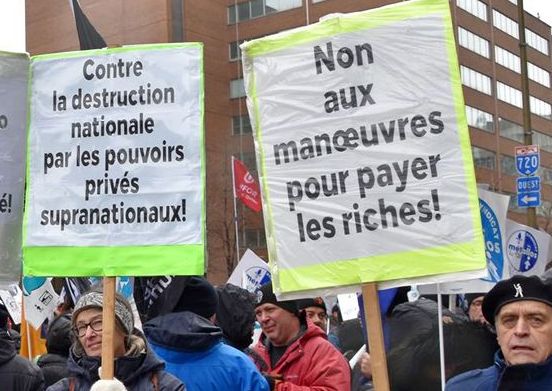 On September 10, 2024, the fall
session of the Quebec National Assembly
opened with an agenda which pursues the privatization of
public
services and sell-out of natural resources on an ever
grander
scale. A
series of bills steps up the sellout of natural resources
and
makes the
people pay
for the infrastructure needed to serve this sellout. All
of it
contributes to transportation and energy corridors and
the
supply chain
of
critical minerals needed by the U.S. war economy.
On September 10, 2024, the fall
session of the Quebec National Assembly
opened with an agenda which pursues the privatization of
public
services and sell-out of natural resources on an ever
grander
scale. A
series of bills steps up the sellout of natural resources
and
makes the
people pay
for the infrastructure needed to serve this sellout. All
of it
contributes to transportation and energy corridors and
the
supply chain
of
critical minerals needed by the U.S. war economy.
Before the National Assembly adjourned for the summer, on May 9, the Legault government tabled Bill 61, An Act enacting the Act respecting Mobilité Infra Québec and amending certain provisions relating to shared transportation. This new agency -- Mobilité Infra Québec -- will have a board of directors and sole jurisdiction over a complex transport project entrusted to it by the government.
Bill 62, An Act mainly to diversify the acquisition strategies of public bodies and increase their agility in carrying out infrastructure projects, also tabled on May 9, introduces the term "partnership contract ... using a collaborative approach" in place of the term "public-private partnership" (P3) which has now been abandoned.
What the government calls a "new type of contract" and "using a collaborative approach" is in fact a well-known method of paying narrow private interests to do the work of the civil service. The supranational "consulting firm" McKinsey & Company says that since its formation in 1926, "McKinsey has operated as a single global partnership united by a strong set of values, and the drive to deliver positive, enduring change." It was also contracted by the federal government to set up the Canada Infrastructure Bank, while a former McKinsey partner ended up as CEO of this bank to offer contracts to McKinsey.
Bills 61 and 62 on infrastructure projects demonstrate Legault's intention to intensify privatization in awarding public infrastructure projects, including Hydro-Québec's expansion projects.
On June 6, the former Minister of the Economy, Innovation and Energy, Pierre Fitzgibbon, tabled Bill 69, An Act to ensure the responsible governance of energy resources and to amend various legislative provisions, in the National Assembly. The bill is integral to the restructuring of the state to better serve major supranational private interests, and more specifically to integrate Quebec's electricity resources into the U.S. energy transport corridors. Bill 69 will give the Minister of the Economy, Innovation and Energy new powers, including "establishing and implementing an integrated energy resource management plan" for Quebec. It is already public knowledge that Hydro-Québec has signed contracts to export what it calls "green electricity" to the United States, and other schemes are in the pipeline.
Quebec's subsurface has also been made available for plundering with Bill 63, An Act to amend the Mining Act and other provisions, tabled on May 28 by Quebec's Minister of Natural Resources and Forests, Maïté Blanchette Vézina. Environmental organizations have strongly opposed the bill, which they say is far from putting an end to the archaic "free mining" regime. This concept gives mining companies all sorts of privileges to extract coveted critical minerals from Quebec's subsurface, not only by the electric vehicle industry, but also by the U.S. Department of Defence (DoD) for its war industry.
 Last
May, for example, the DoD and Natural Resources Canada
provided
tens of
millions of dollars in funding for Lomiko Metal's
feasibility
study for
a graphite mine in the Petite Nation region of
south-western
Quebec. On
September 26, the same DoD announced $18 million in
funding for
a
British
Columbia company called Nano One Materials. The company
has set
up a
pilot plant in Candiac, south of Montreal, to produce
lithium
iron
phosphate (LFP), the only plant of its kind in North
America.
Last
May, for example, the DoD and Natural Resources Canada
provided
tens of
millions of dollars in funding for Lomiko Metal's
feasibility
study for
a graphite mine in the Petite Nation region of
south-western
Quebec. On
September 26, the same DoD announced $18 million in
funding for
a
British
Columbia company called Nano One Materials. The company
has set
up a
pilot plant in Candiac, south of Montreal, to produce
lithium
iron
phosphate (LFP), the only plant of its kind in North
America.
LFP is the active material in the cathodes of rechargeable lithium-iron-phosphate batteries. As far back as 2016, the U.S. Army Research Laboratory (ARL) gave Hydro-Québec's research and development nearly $10 million for a portable rechargeable lithium-cobalt-phosphate battery. This was achieved in 2018 to the Pentagon's specifications.
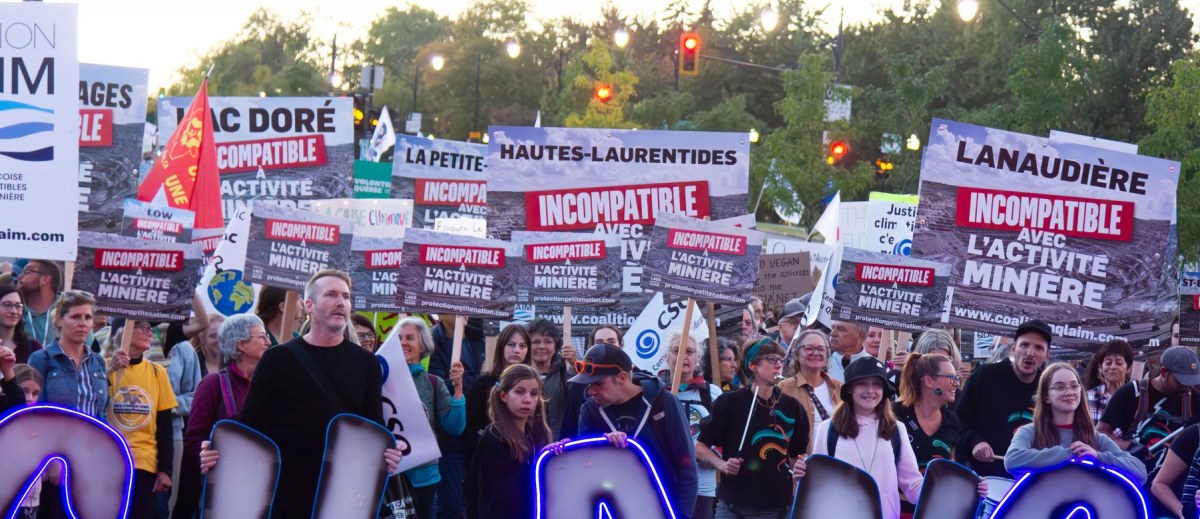
Contingent in action for
the environment September 27, oppose mining in Petit
Nation
region and
others
in Quebec.
All this illustrates that these laws scheduled to be adopted by the National Assembly this fall are far from being for purposes of developing an economy that serves first and foremost to ensure the energy security of Quebec and Canada and to build an economy that serves the needs of the people. These laws and the schemes that accompany them are a way of making Quebec's natural resources available to the U.S. war economy.
The people of Quebec and Canada do not subscribe to such an outlook that disinforms on what the real issues are when it comes to fighting for a bright future for themselves and for all of humanity. More specifically, they reject this notion that a "green" economy means that Quebec and Canada's economies should be integrated into the U.S. war machine or be subject to pay-the-rich schemes.
Super
Sellout Legacy of Outgoing
"Super Minister"
In the hours following the announcement on September 4 of the resignation of the man known as Quebec's "super minister" Pierre Fitzgibbon, business circles praised him eloquently, especially his reform of Investissement Québec and the development of the battery supply chain.
The Legault government's reform, starting in 2020, of the Crown corporation known as Investissement Québec is the reform in question. As Minister of the Economy in 2019, Fitzgibbon sponsored Bill 27, An Act respecting mainly government organization as regards the economy and innovation, adopted by the Quebec National Assembly on December 6, 2019. One of the objectives of this Act, according to Fitzgibbon himself, was to double foreign investment in Quebec within five years. The way to achieve this was to transfer a whole range of services from Quebec's Ministry of Industry and Innovation to the Investissement Québec (IQ) agency, so that IQ would be a one-stop shop for private companies based in Quebec. He also set up IQ international to facilitate the export of products from Quebec-based companies and "accompany foreign companies as they set up shop in Quebec."
According to results released by IQ and its international arm for the fiscal year April 2023 to March 2024, $13.1 billion in new foreign direct investment came into Quebec, almost six times higher than recorded for fiscal 2018-2019 ($2.3 billion). According to IQ's press release, "investments related to the establishment of the battery industry on Quebec soil, as well as those in the natural resources sector, represent a significant share" of prospecting activities carried out between April 2023 and March 2024.
What Investissement Québec doesn't mention is that all these investments have been accompanied by pay-the-rich schemes worth hundreds of millions, if not billions of dollars, put forward by the Trudeau and Legault governments. Currently, several of these foreign investments in the battery industry remain uncertain, including Ford, EcoProBM and SK On's $1.2 billion cathode plant project in Bécancour, which has been on ice since April 30. The fate of Northvolt's future $7 billion battery cell plant in McMasterville also remains uncertain following the parent company's recent setbacks in Sweden.
During the presentation of IQ's latest financial year in May, journalists wanted to know whether IQ international was present in Israel. IQ international CEO Hubert Bolduc proudly boasted that he had been on the first mission that Fitzgibbon made to Israel in 2022, "the one that gave him [Fitzgibbon] the idea to say that there's something to be done in that country. Tech, innovation, cyber security... We saw things there that made us realize that there was something to learn from Israel in these sectors," he added. "If we're lucky enough to have eyes and ears over there, we'll take a look at all the projects. [...] We're going to be opportunistic," he said.
The fact remains that the Quebec government opened a trade office in Tel Aviv in 2023 and refuses to close it, despite repeated calls from numerous human rights organizations and the many petitions circulating, including one to the National Assembly that garnered nearly 12,000 signatures in the space of a few months.
What all this reveals is that unprincipled politicians from cartel parties who criss-cross the world like travelling salesmen, selling off Quebec's natural resources to the highest bidder, do not represent the aspirations of the workers and people of Quebec. The alternative the working class is striving for is a nation-building project in which the economy is the guarantor of everyone's well-being, not that of a handful of narrow private interests.
Replacement "Super Minister" Well
Versed in
North American Integration
On September 5, 2024, Quebec Premier François Legault announced that Minister of Immigration, Francization and Integration Christine Fréchette, the MNA for the riding of Sanguinet, on Montreal's South Shore since 2022, would assume the post of "Super Minister" Pierre Fitzgibbon who resigned on September 3. She will now become the new "Super Minister" -- Minister of Economy, Innovation and Energy; Minister Responsible for Regional Economic Development; Minister Responsible for the Metropolis and the Montréal Region. What is significant is how well versed she is in how to integrate Canada into the U.S. war economy and trample underfoot the national sovereignty of both Canada and Mexico and any country which defies the U.S. rules-based international order.[1]
Her 2005 paper entitled "Triumvirate: A North American Interparliamentary Innovation," makes the contribution she seeks to make amply clear. She advocated that "establishing a regional economic block such as NAFTA [North American Free Trade Agreement] should require the constant attention of policy-makers; if only to address the many trade, security and development issues that arise." To achieve this, she advanced the idea of "a meeting of legislators from Canada, the United States and Mexico" where they would discuss issues related to four themes: the creation of North American trade corridors, immigration, the use of renewable energy and NAFTA's chapter on investments."[2]
The idea of a "meeting of legislators" never got off the ground but the integration did carry on with the summit in Waco, Texas of the U.S. and Mexican presidents and the Canadian prime minister, in March 2005. That first summit set the stage for the annual summits of the "three amigos," as part of the "Security and Prosperity Partnership of North America" to further integrate the economies of Canada and Mexico into the U.S. war economy.
With such a background, it is clear why Legault appointed her to head the two important ministries of Economy and Energy to carry on the integration of Quebec's economy and natural resources into the U.S. war economy.
Notes
1. The biography of the newly minted Minister of the Economy, Innovation and Energy shows how a point person of the state is groomed. Fréchette holds a Master's degree in international relations (Laval University, 1994) and a Bachelor's degree in business administration, with a major in economics and international trade (HEC, University of Montreal, 1992). Before being elected for the first time to the National Assembly on October 3, 2022, she was President and CEO of the Eastern Montreal Chamber of Commerce (2016-2021 and, before that, Director of external and institutional relations at Montréal International, which describes itself as "Greater Montréal's economic promotion agency" (2014-2016). From 2012 to 2014, under the PQ government of Premier Pauline Marois, she served as Assistant Chief of Staff for the office of the Minister of International Relations, La Francophonie and External Trade. From 2008 to 2012 she was U.S. politics analyst for Radio-Canada and Groupe TVA, radio stations 98.5 and 93.3 on the FM band. Between 2007 and 2012, she worked as coordinator, Chair in American Political and Economic Studies and Chair in Contemporary Mexican Studies, Université de Montréal (UdeM). Fréchette was also a board member of the North American Center for Transborder Studies, Arizona State University from 2006 to 2011, and of the Observatory of the Americas at Université du Québec à Montréal (UQAM) between 2006 and 2007.
In 2006 she was a member of the electoral observation mission for the Organization of American States (OAS), sent to Honduras, Bolivia and Venezuela to oversee general and presidential elections in those countries. Between 2005 and 2008, she was also a board member of the Montreal Council on Foreign Relations (MCFR), which describes itself as a non-profit, non-partisan, private organization.
This is the same organization that invites Canada's ministers of Foreign Affairs to speak to a select group of invited people to present "the government's vision." Last November, Canada's Foreign Affair Minister Mélanie Joly spoke there to defend Canada's support for the Zionist crimes committed against the Palestinian people in Gaza.
Between 2004 and 2007, she was a board member of the Montreal Centre for International Studies – Cérium (UdeM). She also founded and served as Director of Triumvirate, North American Forum on Integration (NAFI), between 2002 and 2011.
2. "Triumvirate: A North American Interparliamentary Innovation," Christine Fréchette, Canadian Parliamentary Review, Autumn 2005.
(Assemblée nationale du Québec, Montréal International, Montreal Council on Foreign Relations, Canadian Parliamentary Review)
Quebeckers Say No!
to "Greening"
Transition

Demonstration
outside Quebec National Assembly September 12 against
sections
of Bill
69 that open the door to further privatization of
Hydro-Québec.
"Super Minister" Pierre Fitzgibbon left the Quebec government after sponsoring the tabling of Bill 69, An Act to ensure the responsible governance of energy resources and to amend various legislative provisions, on June 6, 2024. Presentations for specific consultations on the bill were held from September 10 to 16, led by Christine Fréchette, former Minister of Immigration appointed to replace Fitzgibbon as Quebec's new Minister of the Economy, Innovation and Energy.[1]
 As
soon as it was tabled, Bill 69 provoked numerous
responses and
objections, as it would open the door to further
privatization
of
Hydro-Québec's assets, give private companies a
guaranteed
rate for
the electricity they produce, and introduce variable
rates for
residential power as of April
2026.[2]
As
soon as it was tabled, Bill 69 provoked numerous
responses and
objections, as it would open the door to further
privatization
of
Hydro-Québec's assets, give private companies a
guaranteed
rate for
the electricity they produce, and introduce variable
rates for
residential power as of April
2026.[2]
Following Minister Fitzgibbon's resignation, more than twenty environmental, labour and community organizations published a joint letter calling for work on Bill 69 to be suspended because its "orientations were neither presented to the public in the party's electoral platform nor debated, but rather determined by a small number of people, including Minister Fitzgibbon himself, behind closed doors."[3] The Quebec Federation of Labour (FTQ) agreed: "We need to offer Quebeckers a 21st-century vision of energy development. Bill 69 jeopardizes the survival of Quebec's social safety net, and we cannot endorse this approach. Collectively, we have a duty to leave future generations a coherent and sustainable energy policy."
Notes
1. Christine Fréchette's immigration portfolio has been handed over to Jean-Fran ois Roberge, who already holds a number of ministerial posts, including Francization and Integration, responsible for French Language, Canadian Relations and Francophonie, Democratic Institutions, Access to Information and Protection of personal Information and Laicity (secularism). With all these overlapping ministries under his responsibility, political analysts have rightly or wrongly dubbed Jean-Fran ois Roberge the new "Minister of Identity."
2. See "Sharp and Immediate Opposition from Trade Union Organizations to Further Privatization of Hydro Québec," Geneviève Royer, TML Monthly, July 2024.
3. "Fitzgibbon's departure: suspension of work on Bill 69 requested," open letter, September 4, 2024.
Energy Transition Benefits U.S. War Economy
Bill 69, An Act to ensure the responsible governance of energy resources and to amend various legislative provisions, amends 15 laws and seven regulations. The Legault government touts it as an integral part of the transition plan to "green" energies and "zero-carbon-emission" for the Quebec economy for decades to come. The changes to Investissement Québec and Hydro-Québec and Bill 69 and Bill 63 amending the Mining Act are all part of a plan to subjugate Quebec to the warmongering plans of the U.S.
In a series of radio interviews on September 3 and 4, before he resigned, "Super Minister" Pierre Fitzgibbon made no bones about defending his energy transition program by stating that he regularly speaks with representatives of the U.S. Department of Defense (DoD), and did so as recently as September 2.[1] He said that DoD representatives have reiterated to him that they are very interested in "working together" to get their hands on Quebec's critical minerals, and he replied, "So me, I say yes, because we want to work with our colleagues in the U.S."
Evidence of this can already be seen in the DoD's U.S.$8.4 million investment last May in the mining company Lomiko Metals to develop a graphite deposit near Duhamel, in southwestern Quebec.
Fitzgibbon will be remembered as the sponsor of Bill 69, which sets the stage for integrating Quebec's energy resources into U.S. energy and trade corridors.[2] He will also be remembered as the minister who put in place the infrastructure to sell off Quebec's mineral resources to the highest bidder, in this case, the DoD, in support of its war economy.
Notes
1. Pierre Fitzgibbon interviewed by "Tout un matin" host Patrick Masbourian, Radio-Canada broadcast, September 3, 2024.
2. See "Quebec 'Clean Energies' Bill Serves to Integrate Quebec's Resources into U.S. Energy, Transportation and Trade Corridors," Fernand Deschamps, TML Monthly, June 2024.
(With information from the Quebec Government, Investissement Québec, Radio-Canada, TML, Le Devoir, Journal de Montréal, Le Droit)
Northvolt Saga Jeopardizes
Quebeckers'
Pension
Funds
For several months now, hardly a day goes by without the Swedish electric vehicle (EV) battery manufacturer Northvolt making headlines. It is all about how the unseemly haste of the governments of Quebec and Canada to hand out oodles of public money to EV battery manufacturers is imbued with corruption and a decision-making process conducted by narrow private interests in the service of the Pentagon.
It all started in the spring when the parent company of Northvolt in Sweden announced a restructuring of its activities in Europe and North America. This was followed by the loss of a major contract with carmaker BMW, which in June cancelled an order worth around three billion dollars. This was said to be because of delays in the delivery of products from Northvolt's gigafactory in Skelleftea, Sweden.
While a lot is written about the Northvolt Saga, kept as hidden as possible is what the Quebec people will lose because their pension funds were invested in an opportunist venture.
To date, the Caisse de dépôt et placement du Québec (CPDQ), which manages Quebeckers' pension funds, has invested $200 million in convertible debt in Northvolt's parent company, as well as $270 million in convertible debt from Quebec's Ministry of the Economy, Innovation and Energy. The Quebec government advanced to Northvolt's Quebec subsidiary $240 million in the form of a mortgage loan to purchase the land for the Quebec plant, which less than a year ago was valued at $40 million. The government has also already spent several million dollars building new road access to the prospective plant. (Building social housing takes years and is wholly inadequate but building the infrastructure required by foreign interests whose investments in Quebec are touted as guaranteeing prosperity is speedy indeed. No problem.)
The government also promised to allocate a 354 megawatt block of power to Northvolt. This is now being challenged by a number of smaller companies that want access to this energy, which they have so far been denied by the former "Super Minister" of Energy Pierre Fitzgibbon.
Premier Legault claims that the Quebec Government will not lose any of the $270 million in the event of Northvolt's financial collapse, while the new "Super Minister" of the Economy, Innovation and Energy, Christine Fréchette, talks instead of a "calculated risk."
Convertible debt, even if it is not converted into Northvolt shares, represents a risk that does not protect the government from significant losses. In an interview with La Presse, professor in accounting at the Université du Québec à Montréal, Saïdatou Dicko, had this to say: "In the event of bankruptcy or restructuring, a proportional calculation is often made. We take all the debts before determining the proportion of each creditor. For example, if the CDPQ represents two per cent of all debts, it will only recover two per cent of the money available to repay creditors."
As of December 31, 2023 -- the most recent data available -- the sums borrowed by Northvolt totalled more than $7.4 billion.
The private financial institution IMCO, which calls itself "an independent, long-term investor for Ontario's public-sector institutions and, among other things manages the Ontario Municipal Employees Retirement System (OMERS), invested twice in Northvolt's parent company, in 2021 and 2022. In 2022 it did so with the Canada Pension Plan Investment Board (CPPIB) and BlackRock for a sum equivalent to $1.5 billion, also in the form of a convertible debt security.
In a press release issued on September 23 by the parent company, Northvolt is "redefining its field of operations" in Sweden, where there is now talk of 1,600 layoffs, including 1,000 workers laid off at its Skelleftea production plant alone, 400 employees at its research and innovation centre in Västeras and 200 employees in Stockholm. Northvolt had already announced in the first week of September that it was suspending cathode production at its Skelleftea plant. It had also given up plans to build another plant at Borlänge, 200 kilometres northwest of Stockholm, where it had originally had a cathode materials project. It also announced on August 20 that it was closing its research and development centre in San Francisco, California, where 200 engineers were losing their jobs, in order to 'transfer its activities' to its research and development centre in Västeras. The other joint venture projects it was considering in Portugal, Poland and Germany have either been put on ice or abandoned.[1]
At the beginning of September, Goldman Sachs, Northvolt's main U.S. financial backer, had already asked U.S. firm PJT Partners which specializes in corporate restructuring, to "advise on all options", including the possible bankruptcy of Northvolt. Volkswagen, Europe's leading carmaker and Northvolt's biggest backer, announced in early September that it might close two of its plants in Germany, something that has never happened in Volkswagen's 87-year history.[2] For the time being, however, it still has plans for a gigafactory to assemble electric cars in St. Thomas, Ontario, financed to the tune of several billion dollars by the governments of Canada and Ontario.[3]
The people of Quebec and Canada are reduced to being spectators of this decision-making process driven by corrupt pay-the-rich schemes from which everyone except the people benefit handsomely. Under the pretext of "building a green economy," pension plans are invested in "calculated risks" while the well-being of the people is sacrificed on the altar of private profit. The governments at the federal and provincial levels are not fit to rule. That is a fact every Canadian and Quebecker knows instinctively from their own direct experience.
Notes
1. Northvolt's 2 million square metre gigafactory in Skelleftea, Sweden, came on stream in December 2021. It is the first of its kind to be launched by a European group on the Old Continent. According to Northvolt and global economic analysts, its aim was to compete with the U.S. company Tesla and Asian producers of lithium-ion batteries for the automotive industry. At the time, Northvolt said that the site was expected to produce enough batteries to power 300,000 electric vehicles each year, with an annual production capacity equivalent to 16 gigawatt hours (GWh), when the plant would reach its full capacity by the end of 2023.
The Swedish media recently reported that in 2024 the plant was operating at less than one per cent of its planned capacity. The annual production target of 16 GWh of battery cells, originally planned for 2023, has now been pushed back to 2026. In fact, just as Northvolt was negotiating with the Canadian and Quebec governments to obtain subsidies of nearly $2.7 billion to build its first battery plant in North America, Northvolt's Skelleftea plant delivered 79.8 MWh of battery cells, or less than five per cent of the facility's total production capacity, in the first nine months of 2023. According to Northvolt, deliveries were particularly low in the third quarter, which ended in September, due to upgrading and maintenance work.
Currently, Northvolt has cash shortfalls of around $1.5 billion, as it had an operating deficit of around $1.4 billion in the first nine months of 2023, more than eight times that recorded during the same period in 2022, according to Swedish financial newspaper Dagens industri.
Northvolt's main shareholders are Volkswagen (21 per cent), Goldman Sachs (19 per cent), Vargas Holding (7 per cent) and Northvolt founder Peter Carlsson (6.7 per cent). They are among the private and public investors who have invested more than $18 billion in Northvolt. In January 2024 alone, the company raised nearly $6 billion in financing of all kinds.
2. According to Le Devoir, "Volkswagen has been suffering for months from falling sales, a weakening auto sector and growing competition from Chinese manufacturers, particularly in China, its main market." The German press is talking about 20,000 German workers being made redundant, despite the fact that the company still made a net profit of 3.71 billion euros in the first quarter of 2024. Volkswagen workers are unionized in the steelworker trade union, IG Metall. IG Metall points out that in 1994 a social pact was signed between the unions and employers, including Volkswagen, banning lays-offs until 2029. Now Volkswagen wants to tear up this agreement.
Volkswagen closed its Westmoreland plant in the United States in 1988, only to return to open an assembly plant in Puebla, Mexico, in 2008, and an EV car plant in Chattanooga, Tennessee, in 2011, where workers were only finally able to unionize in April 2024, after two other unsuccessful attempts.
3. See "Massive New Subsidy for Volkswagen Battery Facility to be Built in St. Thomas, Ontario", TML Monthly, April 2023.
(With files from the Quebec Government, Northvolt, OMERS, TML, Dagen industri, Radio-Canada, Le Devoir, La Presse, Journal de Montréal)
Ontario Government's Anti-Social Offensive
No End in Sight to Corrupt Pay-the-Rich Schemes
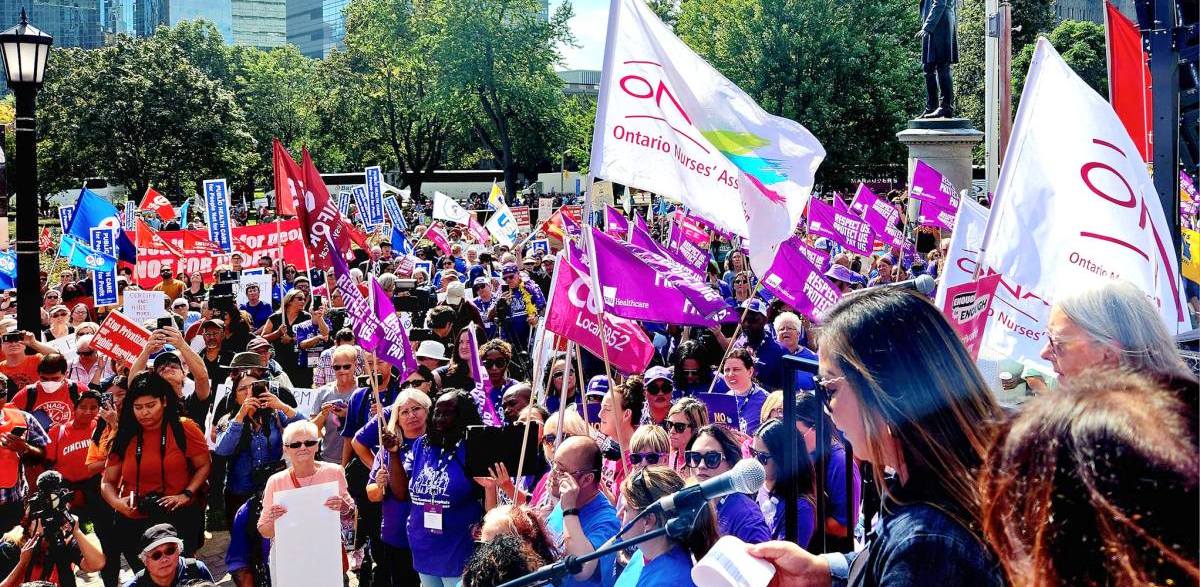
Demonstration for public
health care outside opening of fall session of the
legislature,
September
25, 2023.
Since being re-elected in June 2022, in an election with the lowest turnout of eligible voters in Ontario's history and forming a majority government with only 17.8 per cent of the eligible vote, the Conservative government of Doug Ford is mired in corruption and disrepute.
Government cuts to education, health care, housing and social services hand-in-hand with unprecedented enormous pay-the-rich schemes are par for the course. The Ontario Infrastructure Bank is siphoning money from the public treasury in the name of "public-private partnerships" which everyone knows means public money to guarantee private profits. Nowadays hospitals, housing and transportation systems are funded through the public purse for the benefit of private investors that make a windfall off these projects. They have nothing to do with providing for the well-being of the people whose conditions are getting worse.
Cuts to education funding have increased since the Ford government first came to office in 2018. At the end of April 2024, following the tabling of the Ford Government's budget for 2024-25, the Ontario Secondary School Teachers' Federation (OSSTF) noted:
"The Ford government continues to make misleading claims about supposed 'historic' amounts of funding in public education. However, when accounting for inflation and increases in enrollment, over $2 billion is missing from core education funding for the 2024-2025 school year when compared to the 2017-2018 school year. Funding per pupil has also failed to keep up with inflation as the Ford government has cut effective funding per student by almost 10 per cent since 2018."
The OSSTF added: "The province's underfunding of public education has led to worsening working and learning conditions in Ontario schools, which has fueled an unprecedented staffing crisis for teachers and education workers. This has had a huge impact on students' access to mental health services. High numbers of psychologists, social workers, and other mental health professionals are leaving education because they can find higher wages and better working conditions elsewhere. Wait times continue to grow for students across the province who need access to vital mental health supports."
The Ontario Health Coalition (OHC), which has been active across the province mobilizing opposition to the Ford government's cuts to publicly-funded health care while expanding private health care, noted on September 9 that: "Public hospital funding in Ontario is the lowest out of all the provinces and territories.
"Ontario also has the fewest hospital beds per capita in Canada. When the Ford government took power, it chose to cut hospital funding to below the rate of inflation, increasing it only during the pandemic. Even after the pandemic it funded public hospitals well below the rate of inflation and has capped wages of nurses and health professionals, limiting funding and worsening the health care worker shortage."
On September 3 the OHC informed: "From 2023-2024, Ford gave an increase of more than 200 per cent to private clinics and increased funding to a private for-profit hospital (Don Mills Surgical Unit) by almost 300 per cent. At the same time, they imposed real dollar cuts on public hospitals throughout the entire budget year until the last month of it, by funding them below the rate of inflation leaving them without the resources to deal with the staffing crisis and emergency department and other service closures. The picture is clear: drive the public system into the ground and use the resulting crisis to privatize."
This year in June, the Financial Accountability Office of Ontario (FAO), which uses figures provided by the government, underscored that the Ford government has made cuts to social service spending for people with disabilities, supportive housing and services for children with autism. In its Ministry of Children, Community and Social Services: Spending Plan Review published on June 5, the FAO reports that Ontario Works (OW) allowances have been frozen since 2018, which resulted in a 15 per cent decline in inflation-adjusted OW allowances from an average of $11,154 in 2018-19 to $9,485 in 2023-24 and that, assuming the freeze continues, inflation-adjusted OW allowances will decline by an additional 10 per cent to an average of $8,511 per case by the end of 2028-29. For Ontario Disabilty Support Program (ODSP) payments the FAO estimates that inflation-adjusted ODSP allowances declined from an average of $16,075 per case in 2018-19 to $14,576 in 2022-23 before increasing to $15,095 in 2023-24 and that inflation-adjusted ODSP allowances will increase to approximately $15,646 per case in 2028-29. (Ontario Works itself came into being in 1996 during the anti-social offensive waged by the Mike Harris government to cover up its attacks on those who required welfare to survive.)
Speaking after the tabling of the Ontario budget in March this year, Canadian Union of Public Employees (CUPE) Ontario President Fred Hahn noted in the context of the cuts to social programs: "These cuts come just when Ontarians are in dire need of real and substantial investment in their public services – hospitals, education at all levels, long-term care, social services, childcare, developmental services and more funding for towns and cities.
"The Ford government's gaslighting of Ontarians is exhausting [...] They have taken our public services to the breaking point, affordability is at an all-time low, Ontarians can't find housing or a family doctor. And this budget not only makes no serious effort to repair any of that, it tells us openly they plan to make it worse for all of us, in every part of the province."
Workers and people of Ontario recognize the need to take matters into their own hands. Workers make up the bulk of Ontario's 16 million people and it is they who produce all the wealth and provide the services that the people of Ontario need for their well-being. The situation in Ontario requires them to lead in taking the economy and political affairs in a new pro-social direction that puts the well-being of the people in first place. The electoral process that brings cartel parties to power must be discarded.
(With files from Government of Ontario, Ontario Health Coalition, CBC, CUPE Ontario.)
Broad Resistance to Anti-Social Offensive in Alberta
Public Sector Workers in Action to Defend their Rights and Dignity!
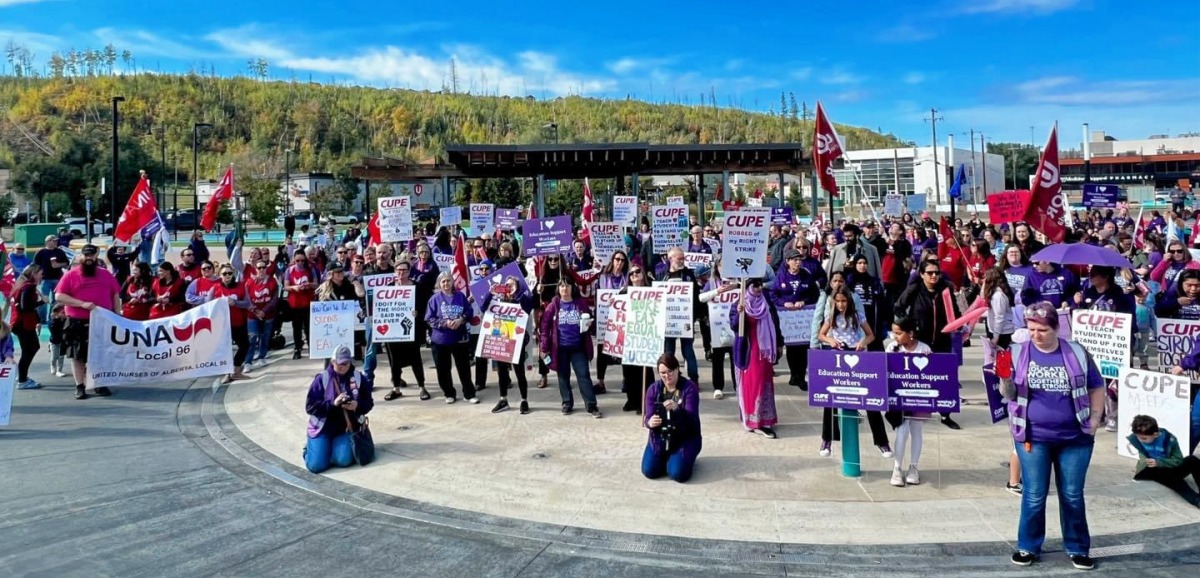
Rally in Fort McMurray September 21, 2024, protesting the
Alberta government's violation of education workers right
to
strike.
Unions representing workers in almost every public service Albertans rely on, including those directly employed by the government and those working for Alberta Health Services, K-12 education, colleges and universities, long term and seniors care, and other public services are now or will soon be involved in contract negotiations.
In all, collective agreements covering 248,000 workers expire this year, covering 10 per cent of the entire labour force in Alberta. This includes approximately 92,000 nurses, technical and professional and support staff who were directly employed by Alberta Health Care which is now subject to a costly and chaotic restructuring, 51,000 education workers, 22,000 provincial government workers, and tens of thousands of workers in long term care, assisted living, home care and seniors' homes.
The vast majority of these workers have received wage "increases" totaling 4.25 per cent over the past four years while during the same period the cost of living has increased 16 per cent. Many public sector workers have not had a wage increase in eight or even ten years, and have lost 20 per cent or more of their real wages. Many workers report that they have to rely on food banks, that their families lack basic necessities, and that they are having increasing difficulty making two ends meet.
The huge drop in real wages has created an enormous problem of recruitment and retention, creating staffing shortages which further fuels burnout from unsustainable workloads and shows a profound lack of respect for the important work they do. Public services are in crisis while the government continues to pursue restructuring based on paying the rich, and the workers providing services essential to the functioning of society are made disposable and considered a cost to be eliminated.
While the unions representing the workers are at the table with many different employers, the provincial government controls all of what passes for "negotiations" and dictates everything. The Public Sector Employers Act, which became law in 2019, allows the Minister of Finance to control all negotiations using secret mandates which employers are told they must adhere to. Employers cannot even inform the bargaining committees of what is in the mandates and what dictates the government has imposed.
Despite this, the government publicly announced an insulting and ridiculous "offer" for all sectors of a four-year contract with a two per cent raise in 2024, a two per cent raise in 2025, and 1.75 per cent raises in 2026 and 2027. This cannot be called negotiations because the aim is not to work out, through discussion, mutually acceptable solutions to problems. On September 10, one day before Fort McMurray education workers were to begin a strike, the government made their strike illegal by imposing a Disputes Inquiry Board (DIB), violating their right to withdraw their labour power. The agenda of wage cuts, intolerable working conditions and insecurity does grave harm to the workers who provide public services and amounts to the wrecking of public services. The workers are having none of it, and every day more actions are taking place where the workers express themselves and inform their fellow workers and the public of their just demands and their significance.
Premier Danielle Smith's response to temporary closures of emergency departments in rural areas for lack of staff was met with outrage across the province. She threatened to use "fear and competition" and to hand over facilities to the Catholic organization Covenant Health which operates some health care facilities in the province and other unnamed "operators." How an emergency department can function without doctors or nurses she did not say. That the premier is not fit to govern is clear enough. Through their actions public sector workers are putting forward an agenda which upholds their rights and provides solutions to the crisis which is threatening the well-being of every member of society.
The battle for public opinion is on! Join in the rallies, pickets, discussions and other actions, speak to your co-workers, your family and friends. Everyone has a part to play because this is everyone's fight -- let each stand in their place!
All Out to Support Health Care Workers!
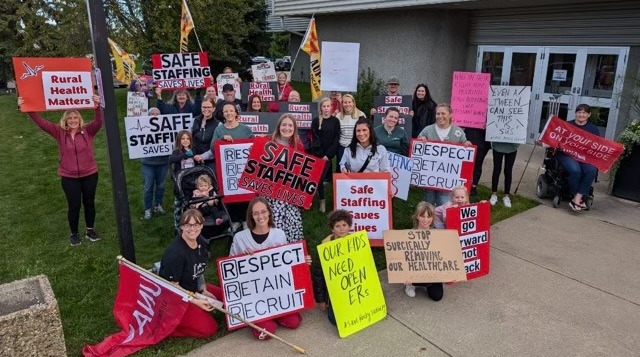
Nurses
join community members in a rally for safe staffing and
safe
care
outside a United Conservative Party members only townhall
in
Rocky
Mountain House, September 26 2024.
Alberta has a rapidly expanding population, growing by 204,677 from April 1, 2023 to April 1, 2024 alone, for a total population of 4,849,906. Even to meet the woefully inadequate Canadian average ratio of nurses to population would require an additional 2,278 nurses, just to maintain the unsustainable status quo. But instead, according to Statistics Canada 20,000 health care workers left the province during that same period. Nurses and other health care workers are currently in negotiations.
United Nurses of Alberta (UNA) Chief Negotiator David Harrigan said that some people may consider the wage demands of Alberta's nurses, who are demanding a 25 per cent increase in the first year of their contract, to be outrageous. What is outrageous, he said, is closing units or entire hospitals and making nurses work around the clock. "They've abused and ignored the system for many years and when you do that there needs to be a giant catch-up in order to set things straight again," Harrigan said.
What is also outrageous is the government's response to closed units. Instead of listening to the nurses and implementing their call to "Recruit, Retain and Respect," Alberta Premier Danielle Smith said she would use "fear and competition," handing over the management of rural hospitals which have been forced to temporarily close their emergency departments for lack of staff to unnamed entities. This announcement has been denounced from one end of the province to the other.
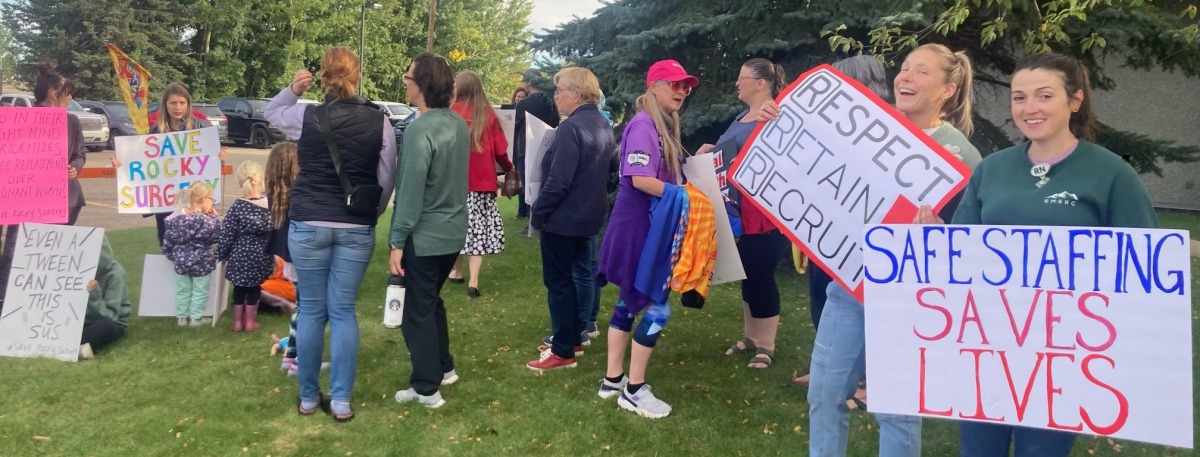
Rally for safe staffing and care, Rocky Mountain House,
September 26, 2024
Nurses are speaking in their own name about their conditions. UNA has posted many videos, which can be viewed on the union's Facebook page, in which nurses speak from the heart about the conditions they face. They say that bedside nurses are saying, "I don't think I can do this much longer." Nurses are asking, "Who is going to look after the patients if everyone is burned out?" They explain that the system is relying on staff, those who are already burned out from working short-staffed, to pick up more and more shifts, that more mistakes are made when people are overworked and when they don't have time to provide adequate care. They emphasize that safe staffing saves lives and warn that young people will stop going into nursing because of these conditions and that nursing shortages are a worldwide problem which must be addressed now.
Alberta Medical Association President Dr. Paul Parks is also speaking out about the severe staffing shortage. "In any of the main emergency departments in the province, we're regularly functioning with only 80 per cent of our nursing staffing that we need," he said.
Nurses are determined in their fight for the working conditions they need, which are the care conditions of their patients. They are in no mood to back down and accept the abuse of a government which responds to the concerns of the health care workers, who are on the frontlines and know what is required, by creating more chaos, privatizing more services, and causing even more acute staffing shortages in the hospitals, all to serve rich private interests.
UNA held a town hall with Local Executives to discuss strike preparation, and has prepared the UNA Strike Manual. In preparation for possible job action, an Essential Services Agreement has been negotiated. Essential Services legislation was enacted in 2015 following a Supreme Court decision which found that outlawing all strikes in the public services was unconstitutional. Under the legislation the union and employer have to agree on the "essential" level of staffing that will be provided during a strike.
Informal mediation is now taking place on a "without prejudice" basis, which means that if no agreement is reached, both parties return to their positions of July 11, 2024. UNA announced on September 20 that a one day Reporting Meeting for about 600-700 delegates has been called for October 10 to provide a bargaining report to the locals. UNA explains, "The report could entail (1) We have a tentative agreement, (2) We have a mediator's recommendation, or (3) we have reached impasse and will not be able to achieve any further movement without job action. The delegates then discuss and provide direction to the Negotiating Committee on next steps, which could be to hold a ratification vote or to proceed with steps necessary to hold a strike vote."
Health care support workers and licensed practical nurses represented by the Alberta Union of Provincial Employees (AUPE) and the Canadian Union of Public Employees (CUPE) are also speaking out, organizing and taking action. AUPE has 82,000 members whose contracts have expired this year and are now in negotiations. Spirited rallies were held on September 7 in Calgary, Edmonton and Red Deer where members of AUPE were joined by supporters including workers from other unions. The rallies were the culmination of summer long actions, more than 50 pickets and rallies across the province. Health care workers represented by the Canadian Union of Public Employees also held a lively rally in Edmonton on September 14 to say Enough is Enough! Their Day of Action shone a light on the critical issues of low wages, staffing shortages, and the privatization agenda being pursued by the UCP government, all of which have made the crisis in health care even more acute. Workers from other towns and cities, as well as workers from other unions and supporters joined local health care workers at the Edmonton rally. The message of the health care workers was: "We are united with our union siblings, friends, allies & community and we will win this fight and protect health care for every Albertan! Solidarity!"

CUPE rally in Edmonton, September 14, 2024
AUPE Northwest Region vice-president Sandra Azocar emphasized that AUPE has been telling the government to address the staffing shortage for decades, long before it reached the current acute crisis level, particularly in rural Alberta. To date none of the unacceptable conditions in long term care and assisted living facilities exposed during the COVID-19 pandemic have been corrected. In fact, Azocar said, conditions are getting worse.
AUPE has also launched a campaign called "Strike a Change for Alberta Seniors," including a petition and letter writing campaign. The petition calls for a standard of 4.5 hours of direct care per day for seniors in long term care, an increase of 2.5 hours from the current two hours of care per day, not nearly enough time to meet the need of frail seniors. To sign the petition, go to https://www.aupe.org/news-and-publications/campaigns/strike-change-alberta-seniors.
In negotiations, AUPE has proposed a three-year agreement with wage raises of 13 per cent in the first year, 6.5 per cent in the second year and 6.5 per cent in the third year. The union is also proposing a Cost of Living Adjustment (COLA) based on the Consumer Price Index (CPI), to protect workers from falling further behind inflation. AUPE is also finalizing an Essential Services Agreement which will be followed by formal mediation tentatively set for October, a requirement before a strike vote can be held.
Health care workers' wages and working conditions are the conditions of care for the people of Alberta. They are inseparable. Meeting the workers' demands will contribute to overcoming the crisis in health care. Consider for a moment a health care system where those who work and provide care for the people with such dedication under impossible conditions and know what is needed to turn the situation around were the decision-makers, together with their communities. It becomes immediately apparent that a thriving and vibrant health care system is possible. All out to support nurses and health care workers!
BC Election, October 19, 2024
Election Highlights Lack of People's Empowerment
Elections for a new government are taking place in British Columbia on October 19. The NDP and the BC Conservative Party have each nominated candidates in all 93 ridings and the Green Party is running in 69. BC United, formerly known as the BC Liberal Party, which formed the official opposition in the legislature until dissolution on September 21, is not running candidates. Its leader has struck a backroom deal with the leader of the BC Conservative Party to "unite the centre right to defeat the NDP."
 No
members of either one of these parties, let alone the
citizens
of BC
had a say in the matter or in the selection of the
candidates
for these
cartel parties. People are told that it is their civic
duty to
vote
even though they do not participate in working out how to
tackle
problems that they are facing.
No
members of either one of these parties, let alone the
citizens
of BC
had a say in the matter or in the selection of the
candidates
for these
cartel parties. People are told that it is their civic
duty to
vote
even though they do not participate in working out how to
tackle
problems that they are facing.
Polls are showing that the Conservative Party, which held only eight of the 87 seats at the dissolution of the legislature, is neck and neck with the NDP following the collapse of BC United which was in power from 2001 to 2017, a period of unprecedented attacks on workers' rights and social programs. It is known that while the NDP pursued an anti-social agenda, should the Conservative Party be elected it will institute another wave of health care privatization and attacks on social programs. Conservative Party leader John Rustad has already announced that his government would repeal BC's Declaration on the Rights of Indigenous Peoples Act and other legislation passed by the NDP.
The NDP is self-servingly promoting research done by BC United to discredit the Conservatives before their marriage of convenience. The research depicts a number of Conservative candidates as supporters of conspiracy theories of the Make America Great Again (MAGA)-Donald Trump variety and voicing anti-immigrant, racist, anti-abortion opinions. NDP leader David Eby said at a campaign appearance on September 27 that Conservative Party leader Rustad and his team are "focused on bizarre internet conspiracy theories -- vaccines are a hoax, the COVID-19 pandemic was a hoax, kids are being forced to eat bugs. ... Today [you see] a significant number of BC Conservative candidates advancing American election conspiracies that the January 6 riot at the Capitol Building was, in fact, a hoax, that it was actors that were made up."
The marriage of the Conservatives with BC United shows how desperate the ruling circles are to ensure the continuation of the pay-the-rich schemes in British Columbia and to smash the peoples opposition. Both parties, Conservatives and NDP, claim that the election of the other would bring disaster to BC. It shows the need for the people of BC to speak in their own name to lay the claims on society which belong to them by right.
Ending the persecution and criminalization of Wet'suwet'en land defenders by the police and courts, and the continuation of the long history of Social Credit, Liberal and NDP governments' violation of Indigenous rights is one important matter. Wet'suwet'en land defenders blocked the Coastal GasLink (CGL) pipeline construction on their territory because the company had no permission from the hereditary chiefs. The CGL pipeline was built to feed the LNG Canada plant in Kitimat which was, according to then NDP Premier John Horgan, a great triumph for BC and Canada. In 2018 he and Prime Minister Justin Trudeau announced with great fanfare the investment by foreign oil monopolies of $40 billion in the LNG Canada project, boasting that it was the "largest private sector investment" in Canadian history, bought with public funds in the form of tax breaks and other subsides valued at $5.35 billion, a monumental pay-the-rich scheme.
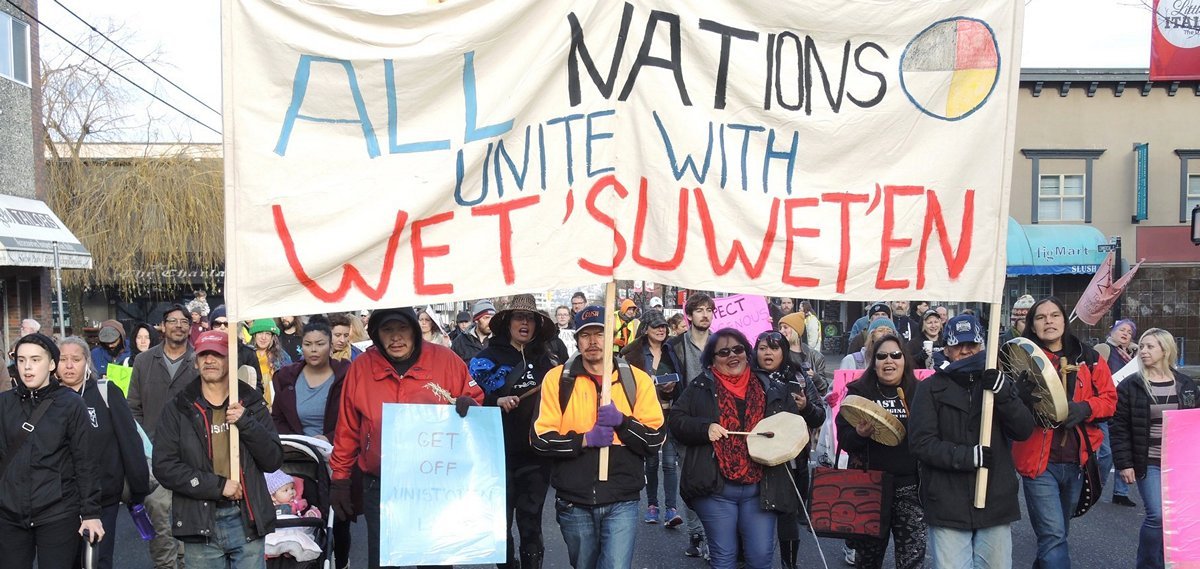
Action
in Vancouver, January 16, 2019, one of many actions
across
Canada,
denouncing RCMP raid on Wet'suwet'en defending their land
against
contruction of the CGL pipeline.
LNG Canada proudly announced "a major achievement" on September 12, that "Just weeks ago, we introduced natural gas to the facility for the first time, from the new Coastal GasLink pipeline." That major achievement could not have happened without the harassment, arrest and imprisonment of Wet'suwet'en land defenders, the destruction of their camps and their removal from their territory by the special militarized unit of the RCMP, all under the direction of the NDP Attorney-General. Yet the argument is presented to the citizens that the NDP is a "better choice" than the Conservatives. So too on every other matter of concern to the people.
Polling firm Angus Reid reports that the core issues are health care, economic growth, neighbourhood safety, and housing affordability. When they speak of issues it is not about what people's concerns are but reduced to which party will you vote for if you are concerned about A, B or C.
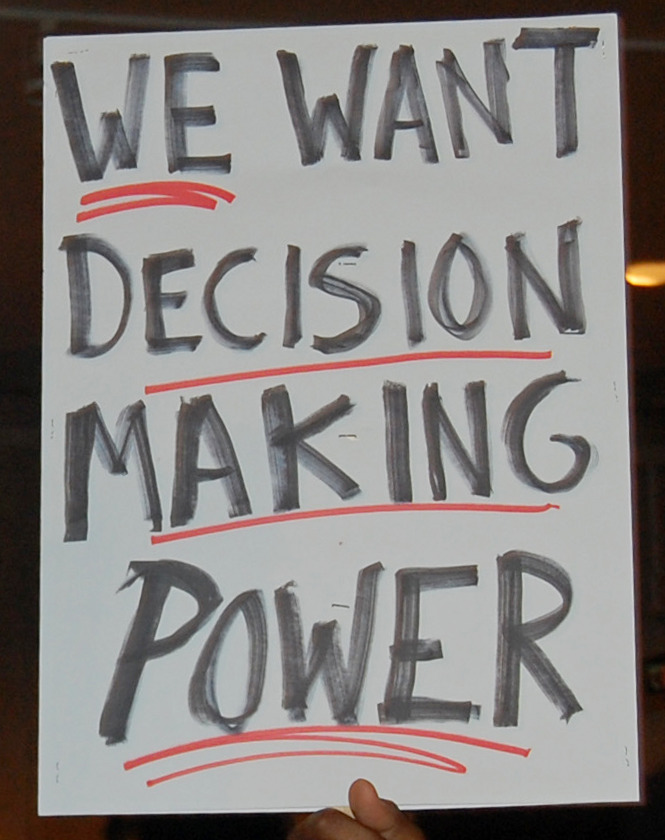 A Canadian
Press report from September 23 was titled
"Crime, disorder take centre stage in BC election, but
statistics tell
complex story." It gives voice to those calling for
increased
police
powers to address social problems through criminalization
and
incarceration. Media highlight
the Eby government's decision to decriminalize then
recriminalize drug
use while in 2023 2,551 people died of overdoses. But no
forum
is
provided for frontline workers, advocates and drug users
and the
community to discuss and work out solutions that can be
implemented to
save lives. Arguments over
Eby's plan to force treatment on people with severe
addiction or
mental
health issues are pro and con, never permitting
investigation
into the
causes of the opioid crisis, discussion by experts,
frontline
workers,
patients and families on how to protect the people and
how to
hold
those responsible
to account.
A Canadian
Press report from September 23 was titled
"Crime, disorder take centre stage in BC election, but
statistics tell
complex story." It gives voice to those calling for
increased
police
powers to address social problems through criminalization
and
incarceration. Media highlight
the Eby government's decision to decriminalize then
recriminalize drug
use while in 2023 2,551 people died of overdoses. But no
forum
is
provided for frontline workers, advocates and drug users
and the
community to discuss and work out solutions that can be
implemented to
save lives. Arguments over
Eby's plan to force treatment on people with severe
addiction or
mental
health issues are pro and con, never permitting
investigation
into the
causes of the opioid crisis, discussion by experts,
frontline
workers,
patients and families on how to protect the people and
how to
hold
those responsible
to account.
Citizens are once again expressing their dissatisfaction with an electoral system that brings parties to power to rule over the people. Once elected, they cannot be held to account for decisions that are harmful to the people and the environment. The people of BC have always been in the forefront of bringing solutions which give the people a say in government and they are sure to step up the fight for a new direction for the economy and for solutions to problems that favour the people and not the oligopolies in control in all sectors of the economy and life in BC.
Throwing a Grenade into the Caucus Room -- Candidate Selection in BC
It was shocking news for many. BC United Party leader Kevin Falcon and BC Conservative leader John Rustad held a press conference on August 28 at which Falcon announced the suspension of BC United's participation in the upcoming provincial election and pledged full support for the Conservatives. This follows several years of bitter rivalry and acrimony between the two leaders and the two parties with Falcon expelling Rustad from the BC United Party back in 2022 and Rustad later joining the Conservatives.
Most BC United MLAs, such as longstanding MLA and former Deputy Premier, Shirley Bond, were caught off guard, along with party riding associations, staffers, donors and voters who were not aware of this rapidly patched together backroom deal. For that matter, neither were most Conservative candidates, riding associations and staffers who were also blindsided.
While pulling the rug out from under his party's candidates (under pressure from financial backers), Falcon appears to have gotten virtually nothing in return out of this backroom deal other than his claim that he was supposedly unifying the "centre-right" coalition in order to defeat the governing NDP. Time will tell if there is more to this story and whether this current rickety coalition will hold together.
For his part, Rustad indicated his only promise was to "consider" allowing some BC United candidates to run under the Conservative banner subject to a vetting process controlled by Rustad. This in itself creates all kinds of problems and a musical chairs-like situation given that only 93 seats are available in the provincial legislature, yet between them, the Conservatives and BC United had previously nominated 140 candidates. Already certain candidates from both parties have been sent the message that, despite being previously nominated, they will not receive Conservative Party blessing.
This backroom deal was a complete and abject capitulation by Falcon that plunged the BC United Party into chaos with some candidates withdrawing from the campaign altogether, others considering running as independents and still others hoping to go with the Conservatives. Mike Bernier, BC United MLA for Peace River South, summed up the wreckage as "[Falcon] went out there. Tried to give the image that he is jumping on his sword when in fact he threw a grenade in our [BC United] caucus room and then ran out."
As journalist Paul Willcocks notes in The Tyee, there is "something broken with a system that allows one person to shut down a party and remove a key option for voters seven weeks before an election." The problem also exists at the federal level where there are all kinds of examples of party leaders and party headquarters determining who gets nominated, often using dirty tricks and manipulations, with voters and even party members left out in the cold.
But that is how the current establishment party system works and it crosses party lines. Candidate selection is in the hands of the political parties which are private organizations and not in the hands of the voters at large. Under this system, party leaders have the power to act as virtual dictators with the right to appoint or cancel candidates as they see fit.
This is not democratic. We need to renew our political process and one of the key issues is candidate selection. Under the present system, parties and party leaders have a hammerlock on the selection process. Why not open things up and have a nomination process through which voters could select candidates instead of the parties?
In its early history, BC had a non-party system of governance where candidates ran as independents. Why not re-think our current situation and adopt new ways of democratic process consistent with the needs of today?
Party Standings in BC
Legislature and
Election Candidates
A provincial election in BC will be held on October 19, 2024. At the time of the dissolution of the Legislative Assembly on September 21, the NDP had 55 seats, BC United 20, Conservative Party of BC eight, BC Green Party two, and Independents two -- a total of 87 seats with none vacant. BC voters will be electing 93 Members of the Legislative Assembly (MLAs), six new seats having been added, four in the Vancouver area, one on Vancouver Island and one in the Interior.
Elections BC reports that at the close of nominations on September 28, 323 candidates had registered. The BC NDP and the BC Conservative Party are each running in all 93 ridings and the Green Party in 69. BC United, the Official Opposition at the time of dissolution, will not be running any candidates. There are 40 Independent candidates and 14 unaffiliated candidates, some of whom are former BC United candidates. Candidates of the Christian Heritage Party, the Communist Party of BC and the Freedom Party are also running.
The BC Liberal Party was in power in BC from 2001 until 2017 under Gordon Campbell and then Christy Clark. In the 2017 election the Liberals won 43 seats, one short of a majority. The BC NDP and the BC Green Party agreed to a Supply and Confidence Agreement and their combined 44 seats allowed them to defeat Clark's government on a confidence vote on June 29, 2017 after which Clark resigned as premier and the lieutenant governor asked NDP leader John Horgan to form a government. On September 21, 2020, in violation of its Supply and Confidence Agreement with the Green Party, Horgan called a snap election in which the NDP won a majority with 57 seats. Horgan announced in June 2022 that he was stepping down as party leader and premier once a new leader was chosen. On October 21, 2022 David Eby was acclaimed as NDP leader and premier.
Following several years of bitter rivalry and acrimony between the two parties, BC United leader Kevin Falcon and BC Conservative leader John Rustad held a press conference on August 28 at which Falcon announced the suspension of BC United's participation in the 2024 BC election. At that time the two parties had nominated 140 candidates so the backroom deal that resulted in BC United throwing its support to the Conservative Party was followed by notice to candidates of both parties who had been campaigning that they no longer had the endorsement of their party. Some BC United candidates chose to run as independents, some withdrew altogether and some were endorsed by the Conservative Party.
(To access articles individually click on the black headline.)
Website: www.cpcml.ca Email: editor@cpcml.ca

